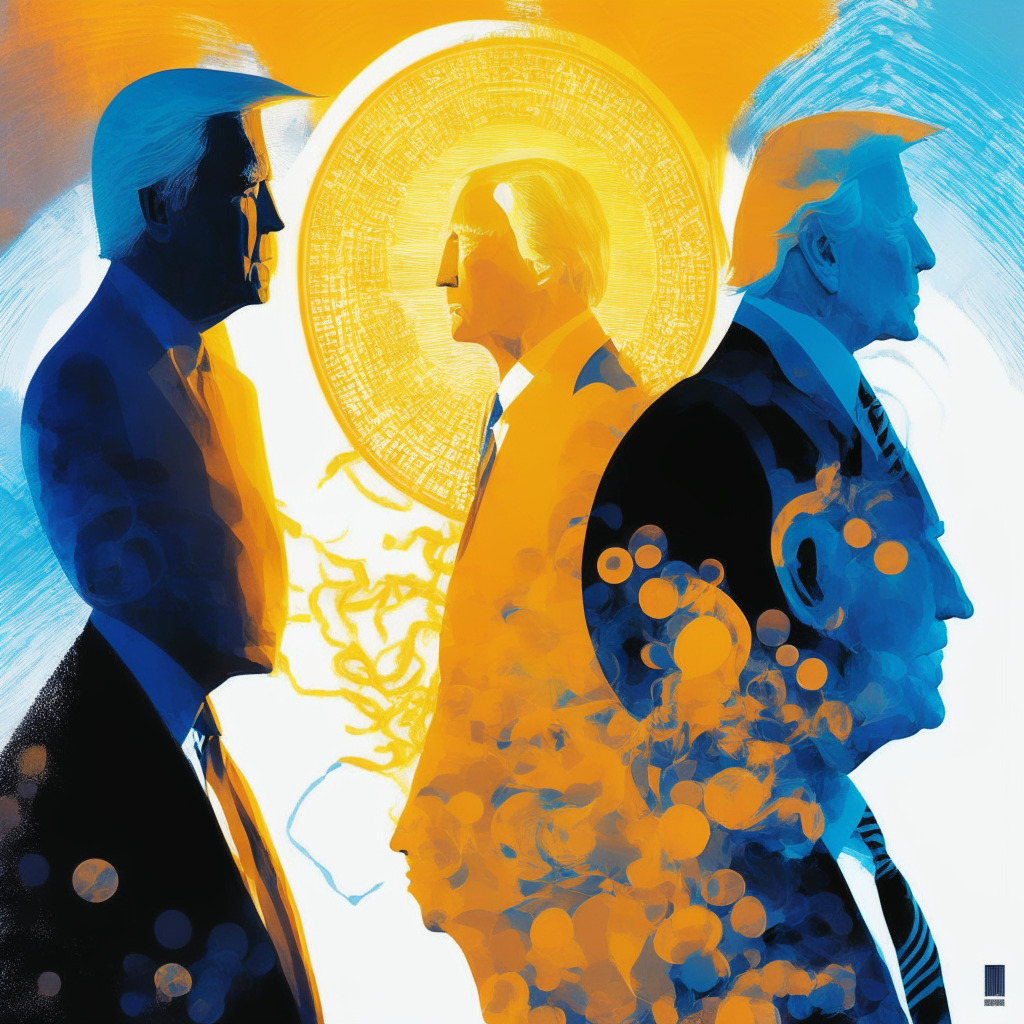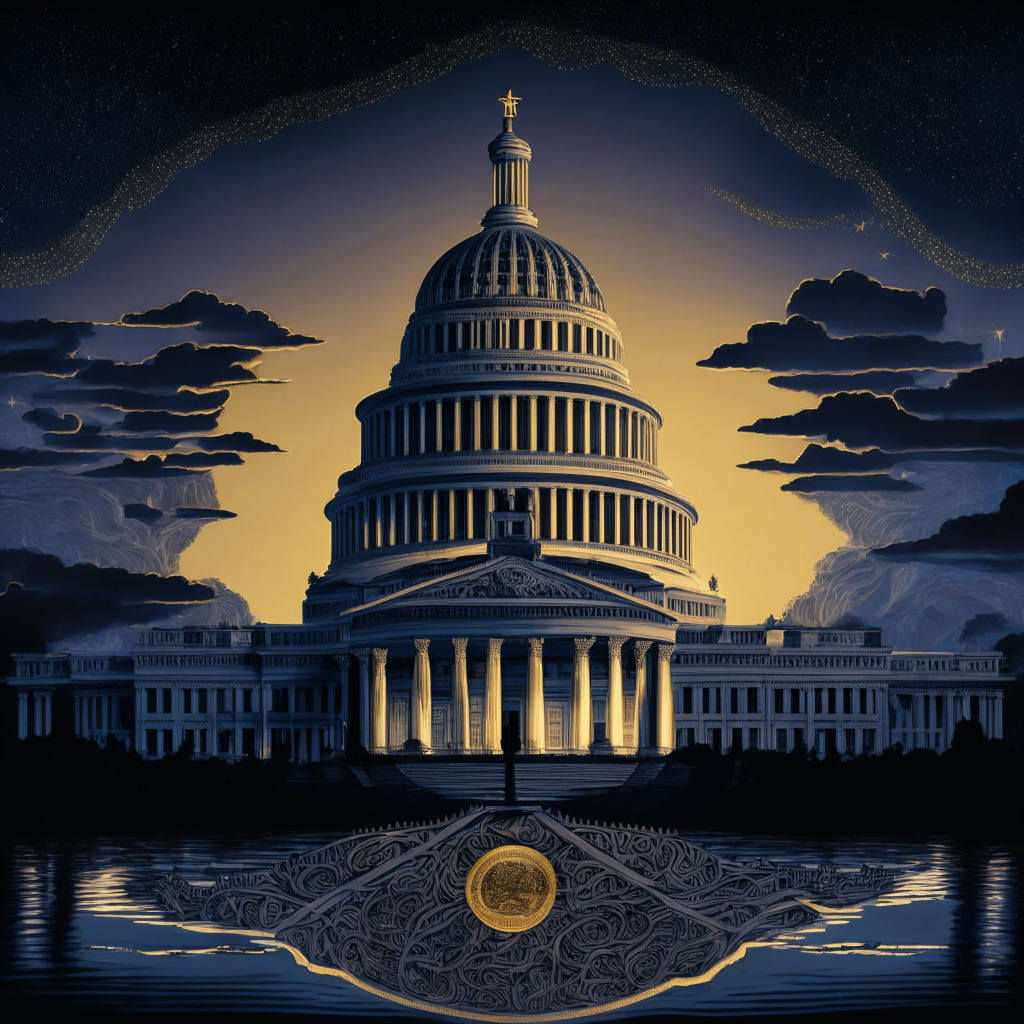The crypto market’s recent volatility is linked to the U.S. jobs data and potential interest rate hike by the Federal Reserve. Bitcoin and other cryptos reacted disruptively, with rapid price shifts influenced by macroeconomic indicators. It highlights the necessity of a nuanced understanding of wider financial systems for crypto enthusiasts, as unwarranted shocks from global markets test the resilience of digital assets.
Search Results for: U.S.
Navigating Bitcoin Investments Amid U.S. Government Shutdown Fears: Strategies and Risks
Bitcoin’s rise towards $28,000 was linked to U.S. debt limit uncertainty. Despite skirting an immediate shutdown, risks of recession persist due to factors like inflation and surging oil prices. Bitcoin investors are bracing themselves for potential volatility as the debt ceiling decision nears, with strategic trading moves critical in this climate of uncertainty.
Understanding the Recent Bitcoin Price Plunge: Navigating the Crosscurrents of Rising U.S. Bond Yields and Bullish Market Sentiment
Bitcoin’s recent price drop is attributed to several factors including a spike in U.S. bond yields, which strengthened the dollar and negatively impacted Bitcoin. Despite bearish indicators, some bullish market sentiment remains due to long position holders still paying for short positions.
Reshaping Crypto Landscape: Impact and Prospects of U.S. SEC-backed Ethereum ETFs
“The Ethereum ETFs’ approval by the U.S. Securities and Exchange Commission symbolizes a crucial regulatory progression, and, despite low initial trading volumes, it opens the door for crypto market expansion. However, investor preferences and wavering organizational confidence could influence the ETFs’ success trajectory.”
FTX Pioneer Sam Bankman-Fried’s Legal Struggles: Is the U.S. Government Too Stringent on Crypto Leaders?
FTX founder, Sam Bankman-Fried, faces opposition from U.S. authorities for temporary release from jail prior to his trial. Accused with fraud-related charges during his tenure at FTX and Alameda Research, he pleads innocent. This situation casts a shadow over the future of crypto technology.
The Lure and Perils of Imminent Ethereum Futures ETFs Launch Amid U.S. Shutdown Fears
Bloomberg analysts predict the launch of Ethereum futures exchange-traded funds (ETFs) in the US, possibly accelerated by a potential government shutdown. The SEC might permit various Ethereum futures ETFs to launch next week. Despite previous failed attempts, analysts give a 90% chance of launching this October, but regulatory complexities and uncertainties remain a concern in the crypto market.
Bipartisan Battle for Crypto: A Deep Dive into U.S. Digital Asset Regulation
Senators Kirsten Gillibrand and Cynthia Lummis have introduced a new crypto bill, the Responsible Financial Innovation Act, aimed at addressing regulatory ambiguity in the US cryptocurrency industry. This legislation could shift the oversight of most digital assets from SEC to the Commodity Futures Trading Commission.
Battleground CBDC: A Bipartisan Struggle Shaping Cryptocurrency’s Future in the U.S.
The House Financial Services Committee introduced three bills halting the Federal Reserve’s considerations towards a Central Bank Digital Currency (CBDC). Republicans expressed fears over the potential impact on traditional banking and the suspense it could cast on the stablecoin market. Democrats, however, pushed for continued CBDC exploration, reminding of its potential benefits in global economic competition. The Federal Reserve reaffirmed its cautious approach towards CBDC, emphasizing concerns over a stablecoin issuance without federal control.
The Tug of War: The U.S.’s Potential Leap into Digital Currency vs Fears of Surveillance
The U.S. House of Representatives is considering the introduction of a Central Bank Digital Currency (CBDC), amidst contrasting views. Democrat Rep. Stephen Lynch calls for a pilot project for a digital dollar, stressing it is “absolutely critical” for the U.S. to show leadership in digital currency development. However, concerns remain regarding transaction management, tracking, and potential regulatory limitation issues.
U.S. Regulatory Hurdles: Driving Crypto Startups Towards Friendlier Shores?
“Ripple’s CEO, Brad Garlinghouse, argues that the U.S. is the worst country for crypto start-ups due to its hesitance towards digital asset innovation. He highlights the UK, Singapore, UAE, and Switzerland as nations nurturing such innovation. Aggressive lawsuits by SEC and CFTC complicate the implementation of crypto regulations in the U.S., possibly inducing a mass exodus of blockchain startups to friendlier jurisdictions.”
AI Partnerships: Unveiling the U.S.-Vietnam Collaborations-Skeletons or Springboards?
U.S. and Vietnam solidify ties through business partnerships focused on AI technologies, cloud computing and semiconductors. Industry giants like Google, Intel, Microsoft, and Nvidia support this initiative, signaling Vietnam’s shift from economic centralization to a more open approach.
Groundbreaking: U.S. Poised for First Spot Ether ETFs – A Game Changer or A Risk Too Far?
“Cboe’s BZX exchange is preparing for a historical first with the potential launch of the U.S.’s maiden spot ether exchange-traded funds (ETFs). The SEC’s approval of such a move would mark a new era of crypto trading, including on-the-spot ether exchanges via ETFs. The decision may reshape the financial landscape, creating a new entry point for traditional investors into the realm of digital currency.”
Navigating SEC’s Stance: The Hopeful Resurgence of U.S. Cryptocurrency Industry
The resurgence in the U.S. cryptocurrency industry is driven by key victories by Ripple and Grayscale against the SEC. The shift is largely due to initial clarity from state authorities, conflicting regulatory statements from SEC and CFTC. Amid this, recent positive court filings and decisions may inject fresh liquidity into the market and encourage institutional investments.
Ripple Effects of Grayscale’s Court Win: Impact on Cryptocurrency Market & U.S. Spot Bitcoin ETF Future
Grayscale’s recent legal victory against the U.S. Securities and Exchange Commission may potentially transform the company into the first-ever U.S. spot Bitcoin ETF. This development could make Alameda Research’s lawsuit against Grayscale, urging for lower fees and a redemption program, unwarranted. However, the lawsuit has brought the debate on fee structures and redemption policies into the spotlight, which could ultimately shape the future of blockchainization.
The Great Debate: U.S. Crypto Development Hiatus or Reinvention?
Antonio Juliano, founder of dYdX, suggests a hiatus for US-focused crypto development due to the austere regulatory framework. He encourages startups to explore non-US markets for less regulatory ambiguity and swifter growth. However, the CEO of Coinbase, Brian Armstrong, is confident in US adaptability, contradicting Juliano’s decade-long pause suggestion.
Navigating U.S. Crypto Regulations: Retreat or Stand Ground for Long-Term Survival?
Antonio Juliano, founder of dYdX, suggests crypto developers should shift their focus from the convoluted U.S. regulatory environment to friendlier overseas markets for the next five to ten years. His perspective sheds light on the industry perception that U.S. lacks definitive digital asset regulations. However, views differ, with some believing that despite current regulatory obscurity, pioneers can seek clarity and establish a safe, legal operating ground in the U.S.
Clash of the Titans: Crypto Community vs U.S. Treasury in Tackling Anonymity and Regulation
“Regulation in the crypto world came under scrutiny after a lawsuit backed by Coinbase challenged the U.S. Treasury Department’s sanctions on Tornado Cash, a crypto transaction platform. Despite uproar from the crypto community, a judge ruled that the Treasury acted within its powers, escalating the ongoing tension between crypto advocates and regulatory bodies.”
Coinbase Achives Unprecedented U.S. Regulatory Milestone: Boom or Bust for Crypto Industry?
The U.S. Commodity Futures Trading Commission (CFTC) has granted Coinbase unprecedented authority to handle bitcoin and ether futures, marking it as the first crypto company to receive registration as a futures commission merchant. This significant development indicates robust systems for capital, disclosures, record-keeping, and customer fund segregation, and it might influence how ether and similar commodities navigate the U.S. regulatory regime. However, concerns arise about potential market manipulation and the impact on other crypto-native companies.
Regulatory Shift: The Stifling or Stability of Cryptocurrency in U.S. Banking
“The U.S. FDIC’s latest risk report indicates a shift from previously indifferent stance towards considering cryptocurrency as an area of concern. The 2023 Risk Review shows FDIC’s readiness to initiate discussions with banks about crypto-asset activities, echoing similar sentiments across U.S. banking agencies. Yet, it also reveals the complex balancing act required in integrating digital assets safely into the conventional banking system.”
U.S. Government Debt Downgrade: A Storm Ahead for Bitcoin or A Silver Lining?
The U.S. Government’s debt downgrade by Fitch Ratings may impact the digital investment market, including Bitcoin. Investors are being driven from traditional assets into safer short-term instruments. Amidst this uncertainty, the potential lies for investors to shift towards decentralized avenues like cryptocurrencies.
U.S. Justice Department vs Binance: Predicting Ripple Effects on Bitcoin Prices in the Face of Scandal
“The U.S. Department of Justice is considering fraud charges against Binance, potentially impacting the crypto market. Regardless of the outcome, experts suggest the market, due to its resilience and increasing utility, could weather the storm. However, possible Binance asset drain could trigger a market crash, while the outcome could affect Bitcoin’s value trajectory by year-end.”
U.S. DOJ’s Innovative Approach to Crypto-Related Prosecution: FTX Founder’s Tryst with the Law
The U.S. DOJ is shifting its legal focus on FTX founder, Sam Bankman-Fried, from treaty obligations to allegations of “illegal campaign finance” within a wire fraud charge. This new move involves combining diverse charges, shedding light on how Bankman-Fried allegedly intertwined illegal campaign finances within broader fraudulent and money laundering schemes.
Anticipating the Impact: Imminent U.S. Crypto Tax Overhaul & Its Potential Consequences
The U.S. is preparing for an overhaul of tax regulations concerning cryptocurrencies, causing uncertainty among crypto firms and industry insiders. These regulations aim to guide businesses on reporting customers’ tax positions, potentially legitimizing the crypto sector. However, timelines and specific implications remain uncertain, stirring industry anxieties and prompting calls for clearer guidelines.
2024 U.S. Presidency & Crypto: Favouring Central Bank Digital Currencies or Upholding Bitcoin?
“According to Grayscale, presidential candidates Joe Biden and Donald Trump might support the development of central bank digital currency (CBDC), despite their unclear stance on Bitcoin. Other candidates have expressed both support for cryptocurrencies and opposition to CBDCs. Amidst this, regulatory uncertainty tests the resilience of crypto firms and generates various views about the future of cryptocurrencies.”
Coinbase CEO’s Firm Stand on Staying in U.S. Despite Regulatory Hurdles: A Brave New Path?
“Coinbase CEO, Brian Armstrong, recently dispelled rumors of the crypto exchange planning a move from the U.S. amid regulatory challenges. Armstrong affirmed the company’s commitment to navigate the U.S. regulatory environment, highlighting the need for pioneers and regulators to work together for technological growth and consumer protection.”
AI Investment Boom: The Potential Impact on U.S. GDP & the Roadblocks Ahead
“Goldman Sachs reports that ‘generative AI’ could fuel global labor productivity by over 1% a year post widespread adoption. Initial AI investments could reach around $200 billion globally by 2025, potentially accounting for 2.5% – 4% of U.S. GDP.”
Impending U.S. DoJ Action against Binance: The Possible Catalyst for a Crypto Market Meltdown
The US Department of Justice (DoJ) reportedly deliberates on fraud charges against Binance, one of the world’s largest crypto exchanges. A potential indictment could cause an exodus from Binance, triggering losses and a broader market panic. Authorities are considering fines and deferred prosecution agreements to minimize consumer harm. Binance prepares for potential fallouts by securing assets and maintaining a healthy ratio for mass withdrawals. The incident highlights complexities in the world of cryptocurrencies, with watchful scrutiny on the looming regulatory battle.
Binance’s Potential U.S. Exit: A Catalyst for Crypto Regulatory Clarity?
“Binance, the crypto exchange platform, is considering shutting its US operations amid intensified regulatory scrutiny and allegations of operating as an unregistered securities exchange. This decision is potentially significant for future crypto adoption, regulatory compliance, and the ongoing institutionalization of cryptocurrencies.”
Navigating Uncertainty: Progress and Hurdles in the U.S. Crypto Regulation Landscape
“Crypto enthusiasts are celebrating progress toward a new U.S. oversight system for digital assets despite uncertainties. The development involves digital assets legislation addressing regulation framework, stablecoins, and crypto-related money laundering. The law guiding crypto operations leaped over two House committees, indicating progress in U.S. crypto regulation.”
U.S. Crypto Regulation: Balancing Innovation and Compliance in the Blockchain Era
“The U.S Congress moved closer to regulatory clarity with two crypto-related bills: the Financial Innovation and Technology for the 21st Century Act, aimed at crypto company registrations, and the Blockchain Regulatory Certainty Act, aiming to cut down barriers for blockchain developers. However, potential conflicts between lawmakers and industry operators may lead to strenuous compliance requirements, possibly bringing the crypto industry closer to traditional finance rules and limitations.”
U.S. Senate Tightens Crypto Regulations in NDAA 2024: A Necessity or Threat to Blockchain Freedom?
The U.S. Senate’s passage of the 2024 National Defense Authorization Act introduces tighter regulations for financial institutions engaged in crypto trading, marking a significant legislative shift. The bill targets crypto mixers and “anonymity-enhancing” crypto assets and aims to strengthen compliance with money laundering and sanctions laws.
Twitter Handle Takeover Dispute & The Fight for U.S. Crypto Legislation Clarity
“In a recent turn of events, Twitter handle @X was reportedly confiscated and offered to the user as merchandise and a visit to the company after Elon Musk announced a rebranding under the banner ‘X’. Meanwhile, Coinbase CEO has implored US citizens to cast a ‘yes’ vote for the FIT21 Act, fostering innovation and providing regulatory clarity for crypto firms.”































